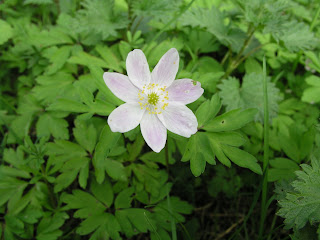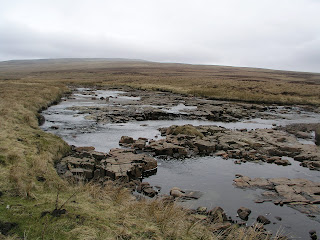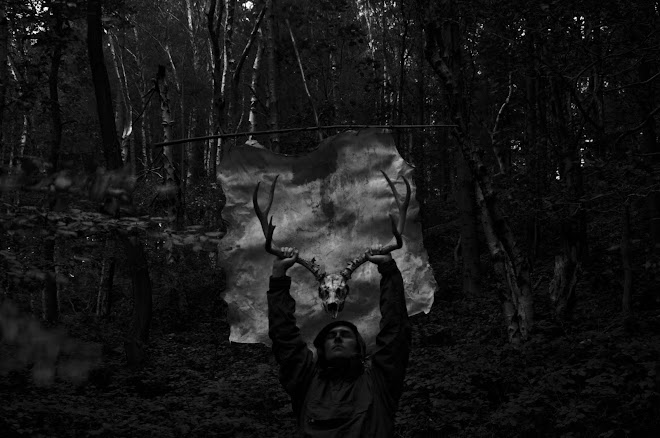skip to main |
skip to sidebar





I had planned to visit the Cheviot Hills in Northumberland but with my day arranged and my maps prepared I awoke in the middle of the night with the desire to see anemones. I have just spent five days in London and while I enjoy the feeling that I am walking the same streets as Doyle, Wilde and Machen the vulgar crowds with their self-aware obsessions and the noisy filth of the city soon becomes tiresome causing the train ride home to the cooler, greener hills to quicken to an irresistible urge.
In the small hours, with my watch glowing on the bedside table, the desire to see anemones filled my mind. I was tired but could not sleep. I ran through all the references to the flower in Dunsany, for whom anemones were a totem of spring and the triumphant resurgence of nature. He wrote about them time and again, as a signum for life and beauty, as a numeral on the clock face of the year by which he ran his life. As I lay waiting for the graying of the dawn I thought about Dunsany’s story Nature & Time, in which the two spirits have a domestic argument on the streets of Coventry (Dunsany seems to have had a special place in the darkest corner of his heart for the industrial cities of the Midlands) and I knew that with the unseasonably warm spring now was the time to find the flowers at their best.
By morning I had abandoned my trip to the hill forts on the Cheviots and set out for a piece of woodland where I knew few other people would trouble to go. I walked amongst fresh green beech leaves, newly sprouted bracken fronds uncoiling from their winter sleep and small clusters of blue dog violet amongst the white wood sorel. And by a small stream, no more than a ditch, on a bank covered in young nettles and brambles, was a patch of wood anemones, their starry flowers blushing pink and white. I sat and listened to chaffinches calling from the tops of trees, the warming sound of early bees on the wing and I forgot everything I knew about London.
Through the streets of Coventry one winter's night strode a triumphant spirit. Behind him stooping, unkempt, utterly ragged, wearing the clothes and look that outcasts have, whining, weeping, reproaching, an ill-used spirit tried to keep pace with him. Continually she plucked him by the sleeve and cried out to him as she panted after and he strode resolute on.
It was a bitter night, yet it did not seem to be the cold that she feared, ill-clad though she was, but the trams and the ugly shops and the glare of the factories, from which she continually winced as she hobbled on, and the pavement hurt her feet.He that strode on in front seemed to care for nothing, it might be hot or cold, silent or noisy, pavement or open fields, he merely had the air of striding on.And she caught up and clutched him by the elbow. I heard her speak in her unhappy voice, you scarcely heard it for the noise of the traffic.
"You have forgotten me," she complained to him. "You have forsaken me here."She pointed to Coventry with a wide wave of her arm and seemed to indicate other cities beyond. And he gruffly told her to keep pace with him and that he did not forsake her. And she went on with her pitiful lamentation.
"My anemones are dead for miles," she said, "all my woods are fallen and still the cities grow. My child Man is unhappy and my other children are dying, and still the cities grow and you have forgotten me!"
And then he turned angrily on her, almost stopping in that stride of his that began when the stars were made.
"When have I ever forgotten you?" he said, "or when forsaken you ever? Did I not throw down Babylon for you? And is not Nineveh gone? Where is Persepolis that troubled you? Where Tarshish and Tyre? And you have said I forget you."
And at this she seemed to take a little comfort. I heard her speak once more, looking wistfully at her companion. "When will the fields come back and the grass for my children?"
"Soon, soon," he said: then they were silent. And he strode away, she limping along behind him, and all the clocks in the towers chimed as he passed.
Lord Dunsany, 1915

At a street corner sat, and played with a wind, Winter disconsolate.
Still tingled the fingers of the passers-by and still their breath was visible, and still they huddled their chins into their coats when turning a corner they met with a new wind, still windows lighted sent out into the street the thought of romantic comfort by evening fires; these things still were, yet the throne of Winter tottered, and every breeze brought tidings of further fortresses lost on lakes or boreal hill-slopes. And not any longer as a king did Winter appear in those streets, as when the city was decked with gleaming white to greet him as a conqueror and he rode in with his glittering icicles and haughty retinue of prancing winds, but he sat there with a little wind at the corner of the street like some old blind beggar with his hungry dog. And as to some old blind beggar Death approaches, and the alert ears of the sightless man prophetically hear his far-off footfall, so there came suddenly to Winter's ears the sound, from some neighbouring garden, of Spring approaching as she walked on daisies. And Spring approaching looked at huddled inglorious Winter.
"Begone," said Spring.
"There is nothing for you to do here," said Winter to her. Nevertheless he drew about him his grey and battered cloak and rose and called to his little bitter wind and up a side street that led northward strode away.
Pieces of paper and tall clouds of dust went with him as far as the city's outer gate. He turned then and called to Spring: "You can do nothing in this city," he said; then he marched homeward over plains and sea and heard his old winds howling as he marched. The ice broke up behind him and foundered like navies. To left and to right of him flew the flocks of the sea-birds, and far before him the geese's triumphant cry went like a clarion. Greater and greater grew his stature as he went northwards and ever more kingly his mien. Now he took baronies at a stride and now counties and came again to the snow-white frozen lands where the wolves came out to meet him and, draping himself anew with old grey clouds, strode through the gates of his invincible home, two old ice barriers swinging on pillars of ice that had never known the sun.
So the town was left to Spring. And she peered about to see what she could do with it. Presently she saw a dejected dog coming prowling down the road, so she sang to him and he gambolled. I saw him next day strutting by with something of an air. Where there were trees she went to them and whispered, and they sang the arboreal song that only trees can hear, and the green buds came peeping out as stars while yet it is twilight, secretly one by one. She went to gardens and awaked from dreaming the warm maternal earth. In little patches bare and desolate she called up like a flame the golden crocus, or its purple brother like an emperor's ghost. She gladdened the graceless backs of untidy houses, here with a weed, there with a little grass. She said to the air, "Be joyous."
Children began to know that daisies blew in unfrequented corners. Buttonholes began to appear in the coats of the young men. The work of Spring was accomplished.
Lord Dunsany
Photograph: derelict townhouse, Picadilly, London





For many years High Cup Nick called to me. I have studied it on the map and driven by its vast open mouth, looking up into the rolling clouds that cap its top. I have planned expeditions that have never happened, over night wild camps on the slopes above the trough, long walks down the steep gills that fall into the vale of Eden and then steeper climbs back to the summits but all in vain. But I had never set aside the time to visit the place. The call of this wild and remote place seemed as far away and faint as the moon but like all things it is there for the taking, and if we stop thinking about it and start doing it we get a little closer.
On a grey and ordinary March morning I set off to finally see this place. A long drive to the trail head on the banks of Cow Green reservoir, a few minutes to boot up and check equipment and I was off, striding along the rough tarmac road that leads down to the dam wall that holds back the might of Condatis’ Tees, across the dam and onto the Pennine Way heading west. I have sometimes pondered what it would be like to do one of these long distance walks and today I realised that this is definitely, positively not for me. I have no problem walking long distances, no problem wild camping or doing the day after day after day slog that comes with the challenges – what I dislike, maybe even despise, is the pedestrian nature of these walks.
Other than physical stamina and mental dullness I can see little else that is needed to complete these trails. The Pennine Way is as wide and well marked as a suburban street. At every mile there seems to be a sign post showing the way, a helpful information board provided by some do-gooding organisation and in places where the ground may be a little muddy for gentlefolk they have even provided duck-boards, huge stone slabs and footbridges to get those who lack the initiative across the becks and gills. What is the point of venturing into “Englands Last Wilderness” if it is impossible to lose ones way? I appreciate the arguments about erosion and the impact of thousands of boots on delicate ecosystems but I really do not want to be herded along sanitised corridors in the landscape like so many day-trippers on a bus to Blackpool.
Not only is the walk to High Cup Nick insultingly well marked it is also insultingly boring. Mile after mile of dull heathery hills rising with that rounded convex slope of the North Pennines, a shifting mirage that places the summit always beyond the next ridge. Here you find yourself among some of the highest hills in England – Mickle Fell, Meldon Hill, Dun Fell, Cross Fell but the path winds sheepishly around their lower flanks, across miles of soggy featureless upland plain on which the only point of interest is the soft chuckle of startled grouse and calling lapwings and curlews.
I reached High Cup Nick in a poor humour. The walk had been tiresome and dull, the weather was neither warm and sunny or cold and cloudy – both of which I would have welcomed for their own reasons – but just the sullen dull grey of very early spring. Too early for the flowers of the famous Teesdale Assemblage, too late for the snows that linger long in this sub-arctic microclimate. Even so, when one stands at the head of the vast glacial trough of High Cup Gill and beholds the majesty of the place all the bullshit and interference that has clung to you like the scum of the modern world blows away, leaving you cleansed and quiet. I sat for a long time, a lone tiny figure in this enormous landscape, looking out into the sky. Sat like a falcon on a crag, ready to launch into the shifting clouds, suspended in a world of sky and rock, of greys and black, lost in the soft fall of water and cold whine of wind. But I knew when I had stayed too long. The chill bit and worried any area of exposed skin, hands began to tingle then scream in the coldness, tuning to the pink of boiled lobsters. Taking photographs was difficult, fingers began to stiffen and lose their dexterity, the pain increased until ones whole consciousness was reduced to the need to put on gloves. If there is a Genius Loci of this wild and viscous place it is not to be taken lightly.





I did not have the heart to return by the same route. I had not walked so far just to turn around and go through the same dullness so I consulted my map and looked for an alternative. I had considered walking up the southern slope of Meldon Hill to its rounded summit, 767 metres above sea level and on the walk in the perfectly flat surface of Cow Green reservoir had reflected the hill like a mirror, making it seem nearer and attainable but now I wanted something more interesting than an endless climb to the top of an unremarkable hill. The clouds were starting to roll in like massive white curtains pulled across a stage. On the walk to High Cup Nick I had crossed Maize Beck, a small upland stream flowing roughly north-east to join the Tees and decided that this was where my route lay. I would reject the paths, do away with the duckboards and follow this small mountain river where it lead me.
Maize Beck rises in the huge blanket bogs of Dufton Fell. Water falling in this catchment gathers in the thick peaty soil, thatched with sphagnum moss and tussocks of grass before making its slow way into ditch and sike, runnel and gill. Even it its upper reaches the beck is wide and rocky, alternating between stony rapids and deep dark pools where the water moves slowly, swirling in dark depths that call for wild swimming on warm days. Today is not that day, the wind is rattling the dry heather, the sky is threatening rain and this high in the hills small becks can flash flood, sweeping down turfs and stone in their force. I decide to keep my clothes firmly on my back.
The geology of these hills is varied. There is shiny black limestone, washed smooth and dimpled by millennia of water, vast igneous intrusions of whin sill form cliffs and pinnacles while sedimentary layers lie in slabby formations. The beck cuts down through this landscape, a cold serpent of water, a living presence in a place that can evoke a sense of emptiness and stillness. There is a modern footbridge across the beck and this is where I begin my journey. The map shows a footpath running along the southern edge of the beck – in reality this is a faint and elusive trail that winds between the heather and the stones, sometimes lost from view. This is the kind of place I love, a place where it is not certain where the path lies and where ones skill and strength are tested. Leave the Pennine Way to the ramblers and their Skye Terriers, this is where I want to be.





Upland rivers have a life a vibrancy that fills me with joy. They are young and reckless, capable of acts of destruction and acts that create the most beautiful places. In these hidden valleys where few people visit there are pools of water that are known only to the dipper and the otter. A dipper has been my companion for the last mile, flying back and forth, its white throat flashing in the grey of the day, a small black bullet skimming the surface of the beck. The water runs quickly now, anxious to get to the bottom of the valley. From its source in the bogs to the west to its confluence with the Tees the Maize Beck drops over 200 metres in something a little over 10 kilometres, not a particularly steep drop but one that keeps the water running fresh and fast.
Now the beck seems to be a series of small falls, one following the other as the water flows between square boulders, around rocks and slabs that have taken a strange orange-brown colour, as if stained by the peaty waters. Here it is possible to cross backwards and forwards from one side to the other at will. The rocks are smooth and flat, wide surfaces that make perfect steps. The water flows beneath me as I walk from side to side, feeling the pull of the landscapes, flowing with the water downwards towards the valley bottom.
































